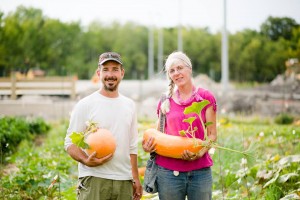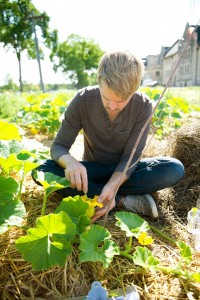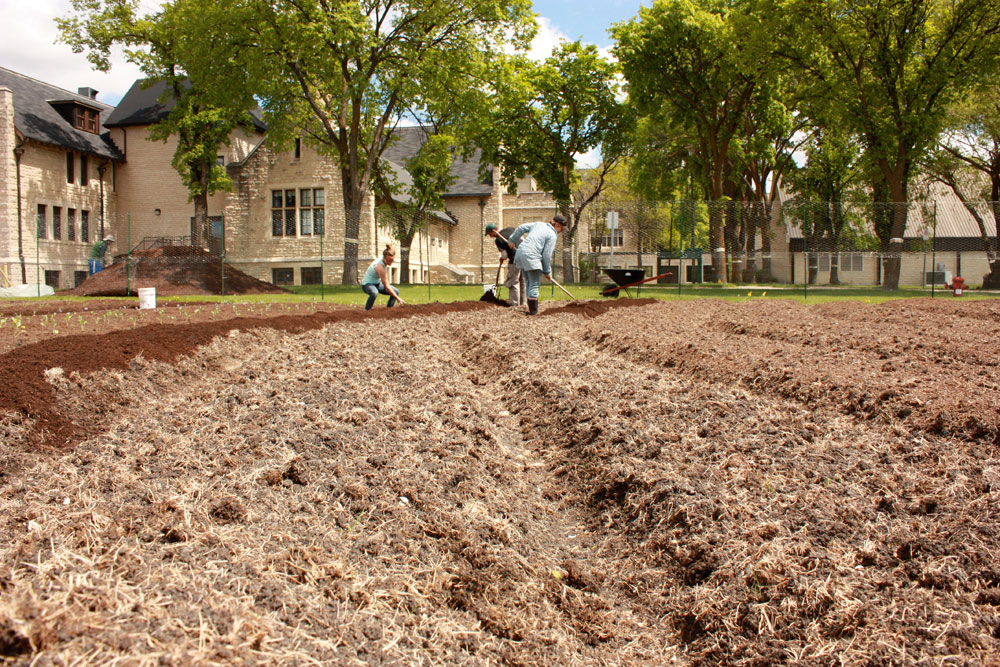Canadian Mennonite University (CMU) made headlines this fall when it was revealed that workers at the CMU Farm, in collaboration with members of the Métis community, had successfully grown an ancient variety of squash from seeds shared with them by the White Earth Seed Library in Minnesota.
The story that accompanied the “Gete-Okosomin” squash seeds was that they were found in a clay ball at an archaeological excavation near the Wisconsin-Illinois border. It went on to suggest that the dating of the clay ball indicated that the seeds were more than 800 years old.
The story captured the imagination of seed savers and gardeners across the continent. It is a good story—but is it true?
When asked, Kenton Lobe, Instructor in International Development Studies at CMU and one of the CMU Farm’s founders, smiles.
“The truth of the story of these squash seeds is still emerging,” he says.

Further digging into the history of the Gete-Okosomin seeds—which, roughly translated, means “cool old squash”—reveals that they were originally gifted to David Wrone, an emeritus University of Wisconsin historian, by some elder women gardeners from the Miami Nation in Indiana in 1995.
One of these squash had been grown and saved by the Miami people for many generations, perhaps even thousands of years.
The men and women stewarding the seed took care to grow them so that they would not cross-pollinate with other kinds of squash, maintaining the variety and characteristics that Lobe suggests resulted in a tasty and prolific squash.
One of the squash grown this season weighed in at more than 30 pounds.
In a note to the White Earth Seed Library, Wrone—who has spent much of his career studying the history of indigenous peoples around the Great Lakes—relates that he had earlier received squash seeds that had been found deep underground in a cave in Kentucky.
They were well preserved in perfect temperature and humidity and were estimated to be several thousand years old. Wrone reports that he grew them out, but that they were “smallish and not as tasty.”
The seeds from the Miami women were shared with Wrone and eventually with White Earth Seed Library.
Over time and through many tellings, these two squash seed stories crossed and turned into one.
The seeds shared with the CMU Farm were, in fact, those grown by the Miami women.

During the last three growing seasons, members of the Metanoia Farmers Worker Cooperative, who work the CMU Farm, collaborated with Caroline Chartrand, who describes herself as “the landless Métis seed saver,” to grow the seeds out and maintain the varietal purity of the squash.
Their pioneering hand-pollinating method involves community members in planting and caring for the plants, and in harvesting the seed to share with others.
Megan Klassen-Wiebe, one of the farmers, presented this methodology at the Indigenous Farming Conference at White Earth Indian Reservation in March 2013.
“When we started the CMU Farm, we talked a lot about seeds—the politics of seeds and the role they play in our global agriculture system,” Klassen-Wiebe says. “To have connected with Caroline and be doing seed-saving work is exciting.”
Lobe says that whether or not the original story is ‘true,’ growing the squash has helped forge relationships between Métis and Mennonites, with Anishinaabe peoples in Minnesota and ultimately, with Miami gardeners.
“The truth is, the work of seed saving has opened up space for indigenous-settler dialogue and has been both hopeful and helpful,” he adds, noting that the CMU Farm lies on what in the 1870s was a Métis river lot, and which is still part of Treaty 1 territory.
Chartrand says that seed-saving is important in Métis culture because in one sense, every time a variety of vegetables goes extinct, part of Métis history is sacrificed.
“I can’t tell you how much I appreciate this partnership I have with Kenton and the farmers at CMU,” she says. “As a result of our work, we have varieties of seeds that were once rare that are now in seed libraries across Canada and the United States.”
While the new development in the Gete-Okosomin story may not seem as exciting as the story the farmers originally received with the seed, it is still fascinating, and shows the care and commitment the Miami people had for this variety of squash.
The story helps those who grow and eat the squash to appreciate the long agricultural history and seed saving skills of indigenous peoples.
“The story opens up people’s imagination to indigenous seed varieties and the stewarding of agricultural biodiversity, which has been done by indigenous farmers from time immemorial,” Lobe says.
The squash seeds will eventually be available for sharing through the fledgling Red River Regional Seed Library hosted on CMU’s campus.
“We love this squash for the story, its unique size and beauty, as well as for its deliciousness and the food it provides through the winter,” Lobe says. “It plays a part in cultivating agricultural biodiversity on the farm and in restoring relationships with people who were here before the Mennonites arrived in this region.”


